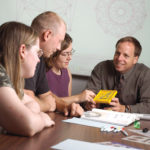
A project to show youth-produced videos on 2,200 Los Angeles city buses, the next generation of a graphical programming language that allows young people to create their own interactive features, and an online game that teaches kids the environmental impact of their personal choices are among 10 winning projects that will share $1.7 million in funding to create new “learning labs of the 21st century” through the MacArthur Digital Media and Learning Competition.
The competition winners will use games, mobile phone applications, virtual worlds, and social networks to advance learning in the 21st century, the foundation said.
It is digital technologies such as these that ensure learning evolves with students, said Connie Yowell, the foundation’s director of education.
“In the digital age, the learning environment is turned on its head—it’s no longer just the dynamic of the student, the teacher, and the curriculum,” Yowell said.
“Today, kids learn and interact with others—even from around the world—every time they go online, or play a video game, or engage through a social networking site. This competition is helping us to identify and nurture the creation of learning environments that are relevant for kids today and will prepare them for a 21st-century workforce.”
Now in its third year, the competition is an annual effort to find and inspire the most novel uses of new digital media in support of learning. This year’s competition was announced in collaboration with President Obama’s “Educate to Innovate” initiative, challenging designers, inventors, entrepreneurs, and researchers to create education technology “learning labs” for the 21st century, with digital environments that promote building and tinkering in new and innovative ways.
Other winners of the global Digital Media and Learning Competition include:
• Conservation Connection: Using webcasting, video blogging, and social networking sites, this project connects kids from Chicago’s West Side with kids in Fiji to work together to protect Fijian coral reefs.
• Mobile Action Lab: Combining the expertise of social entrepreneurs and technologists and the knowledge and ideas of Oakland, Calif.-based teens, this project helps develop mobile phone applications that serve Oakland communities.
• Click! The Online Spy School: Designed to encourage girls’ engagement in the sciences, Click!Online is a web-based augmented reality game for teen girls to solve mysteries in biomedical science, environmental protection, and expressive technology.
This year’s application process included an opportunity for public comment, which allowed applicants to collaborate with others and improve their submissions prior to final review. Of the more than 800 applications from 32 countries, 67 finalists were asked to submit videos of their projects for a final round of judging. Winners were selected from this pool by a panel of expert judges that included scholars, educators, entrepreneurs, journalists, and other digital media specialists.
The competition is funded by a John D. and Catherine T. MacArthur Foundation grant to the University of California, Irvine, and to Duke University and is administered by the Humanities, Arts, Science and Technology Advanced Collaboratory (HASTAC).
“The winning projects exhibit a wonderful creativity in developing learning platforms and environments that promote participatory and collaborative engagements for kids to learn with and from each other in their everyday engagements,” said Duke University’s Cathy N. Davidson, co-founder of HASTAC, along with David Theo Goldberg of the University of California Humanities Research Institute.
“We are witnessing the profound transformation in how young people will be learning in the future, and these projects are helping to lead the way,” Goldberg said.
Competition winners were drawn from two categories: 21st Century Learning Lab Designers ($30,000 to $200,000) and Game Changers ($5,000 to $50,000). Learning Lab Designer award winners will share $1.7 million for learning environments and digital media-based experiences that allow young people to grapple with social challenges through activities based on the social nature, contexts, and ideas of science, technology, engineering, and math.
Game Changers awards, which are to be announced on May 25th, will share $250,000 for creative levels designed with either LittleBigPlanet or Spore Galactic Adventures. The games offer young people learning opportunities as well as engaging play. Each category includes several Best in Class awards selected by expert judges, as well as a People’s Choice Award to be selected by the general public in late May.
Links:
Complete list of winners (PDF)
Digital Media and Learning Competition
- ‘Buyer’s remorse’ dogging Common Core rollout - October 30, 2014
- Calif. law targets social media monitoring of students - October 2, 2014
- Elementary world language instruction - September 25, 2014


